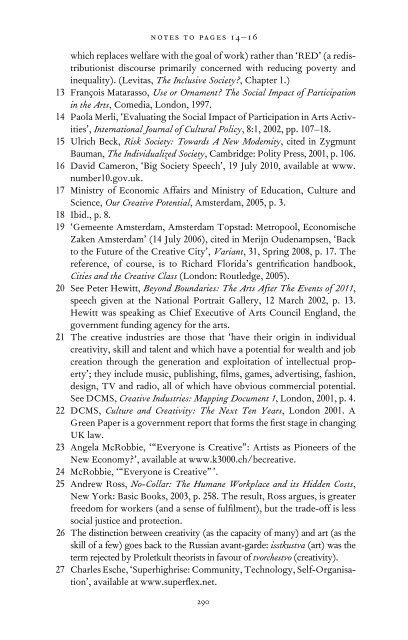Participatory Art and the Politics of Spectatorship - autonomous ...
Participatory Art and the Politics of Spectatorship - autonomous ...
Participatory Art and the Politics of Spectatorship - autonomous ...
You also want an ePaper? Increase the reach of your titles
YUMPU automatically turns print PDFs into web optimized ePapers that Google loves.
notes to pages 14– 16<br />
which replaces welfare with <strong>the</strong> goal <strong>of</strong> work) ra<strong>the</strong>r than ‘RED’ (a redistributionist<br />
discourse primarily concerned with reducing poverty <strong>and</strong><br />
inequality). (Levitas, The Inclusive Society?, Chapter 1.)<br />
13 François Matarasso, Use or Ornament? The Social Impact <strong>of</strong> Participation<br />
in <strong>the</strong> <strong>Art</strong>s, Comedia, London, 1997.<br />
14 Paola Merli, ‘Evaluating <strong>the</strong> Social Impact <strong>of</strong> Participation in <strong>Art</strong>s Activities’,<br />
International Journal <strong>of</strong> Cultural Policy, 8:1, 2002, pp. 107– 18.<br />
15 Ulrich Beck, Risk Society: Towards A New Modernity, cited in Zygmunt<br />
Bauman, The Individualized Society, Cambridge: Polity Press, 2001, p. 106.<br />
16 David Cameron, ‘Big Society Speech’, 19 July 2010, available at www.<br />
number10.gov.uk.<br />
17 Ministry <strong>of</strong> Economic Affairs <strong>and</strong> Ministry <strong>of</strong> Education, Culture <strong>and</strong><br />
Science, Our Creative Potential, Amsterdam, 2005, p. 3.<br />
18 Ibid., p. 8.<br />
19 ‘Gemeente Amsterdam, Amsterdam Topstad: Metropool, Economische<br />
Zaken Amsterdam’ (14 July 2006), cited in Merijn Oudenampsen, ‘Back<br />
to <strong>the</strong> Future <strong>of</strong> <strong>the</strong> Creative City’, Variant, 31, Spring 2008, p. 17. The<br />
reference, <strong>of</strong> course, is to Richard Florida’s gentrifi cation h<strong>and</strong>book,<br />
Cities <strong>and</strong> <strong>the</strong> Creative Class (London: Routledge, 2005).<br />
20 See Peter Hewitt, Beyond Boundaries: The <strong>Art</strong>s After The Events <strong>of</strong> 20 11,<br />
speech given at <strong>the</strong> National Portrait Gallery, 12 March 2002, p. 13.<br />
Hewitt was speaking as Chief Executive <strong>of</strong> <strong>Art</strong>s Council Engl<strong>and</strong>, <strong>the</strong><br />
government funding agency for <strong>the</strong> arts.<br />
21 The creative industries are those that ‘have <strong>the</strong>ir origin in individual<br />
creativity, skill <strong>and</strong> talent <strong>and</strong> which have a potential for wealth <strong>and</strong> job<br />
creation through <strong>the</strong> generation <strong>and</strong> exploitation <strong>of</strong> intellectual property’;<br />
<strong>the</strong>y include music, publishing, fi lms, games, advertising, fashion,<br />
design, TV <strong>and</strong> radio, all <strong>of</strong> which have obvious commercial potential.<br />
See DCMS, Creative Industries: Mapping Document 1, London, 2001, p. 4.<br />
22 DCMS, Culture <strong>and</strong> Creativity: The Next Ten Years, London 2001. A<br />
Green Paper is a government report that forms <strong>the</strong> fi rst stage in changing<br />
UK law.<br />
23 Angela McRobbie, ‘“Everyone is Creative”: <strong>Art</strong>ists as Pioneers <strong>of</strong> <strong>the</strong><br />
New Economy?’, available at www.k3000.ch/ becreative.<br />
24 McRobbie, ‘“Everyone is Creative” ’.<br />
25 Andrew Ross, No-Collar: The Humane Workplace <strong>and</strong> its Hidden Costs,<br />
New York: Basic Books, 2003, p. 258. The result, Ross argues, is greater<br />
freedom for workers (<strong>and</strong> a sense <strong>of</strong> fulfi lment), but <strong>the</strong> trade- <strong>of</strong>f is less<br />
social justice <strong>and</strong> protection.<br />
26 The distinction between creativity (as <strong>the</strong> capacity <strong>of</strong> many) <strong>and</strong> art (as <strong>the</strong><br />
skill <strong>of</strong> a few) goes back to <strong>the</strong> Russian avant- garde: isstkustva (art) was <strong>the</strong><br />
term rejected by Proletkult <strong>the</strong>orists in favour <strong>of</strong> tvorchestvo (creativity).<br />
27 Charles Esche, ‘Superhighrise: Community, Technology, Self- Organisation’,<br />
available at www.superfl ex.net.<br />
290
















